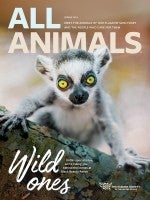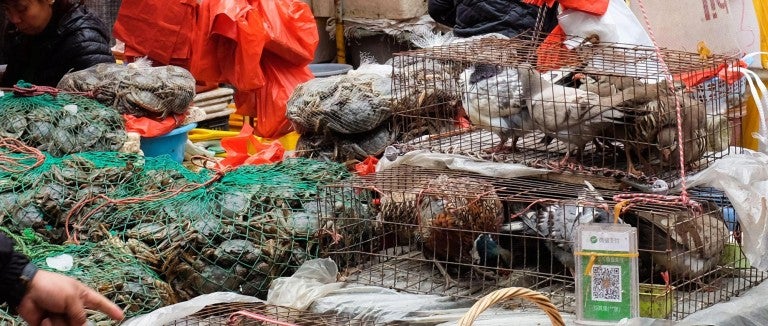It began, almost certainly, in a bat. Then, just as SARS jumped to civets from bats, the virus that causes COVID-19 passed to another mammal, possibly a pangolin. Finally, late last year, the new coronavirus most likely jumped to humans in a wildlife market in Wuhan, China, a densely populated city with an active wildlife market—and direct flights to much of the world.
The market linked to the first cluster of cases sort of place epidemiologists have long predicted would produce a deadly disease that could spread rapidly in humans: crowded, dirty, with at least 75 species of sick, stressed animals—civets and monkeys, rats and hedgehogs—stacked in cages and slaughtered on-site. Unless countries worldwide ban the wildlife trade, experts say, it is only a matter of time before another pandemic as bad or even worse than COVID-19 hits us.
Humane Society International issued a call in April for the worldwide closure of all wildlife markets and an end to the commercial trade in wild-caught and captive-bred wildlife, including the exotic pet trade in the U.S. The organization signed a letter with more than 240 other groups urging the World Health Organization to ask governments to ban wildlife markets and stop or limit the wildlife trade.
Teresa Telecky, vice president of wildlife for HSI, called the coronavirus outbreak, which has sickened hundreds of thousands of people and killed tens of thousands, a watershed moment that requires the world to act to avert a future pandemic. “I am hopeful we learn a lesson,” Telecky says.
I am hopeful we learn a lesson.
Teresa Telecky, Vice President of Wildlife, HSI
In the United States, support was building for action. Senators Cory Booker (D-N.J.) and Lindsey Graham (R-S.C.), Representatives Mike Quigley (D-Ill.) and Michael McCaul (R-Texas) and more than 60 of their colleagues sent an urgent letter demanding change to three major global health entities.
Dr. Anthony Fauci, head of the U.S. National Institute of Allergy and Infectious Diseases, said in an interview on Fox News that wildlife markets everywhere should be closed. “It boggles my mind how when we have so many diseases that emanate [from markets] that we don’t just shut it down. I don’t know what else has to happen.”
Governments elsewhere were acting. In Africa, Gabon banned the eating of bats and pangolins and Malawi banned the bushmeat trade.
In China, where wildlife markets closed in January due to COVID-19, the country’s national legislature in February temporarily banned the hunting, trade and eating of non-aquatic wild animals. HSI is pushing for the ban to be made permanent and for the government to eliminate loopholes allowing captive breeding of wild animals for research, fur and medicine (businesses that are often used as fronts to launder wildlife smuggled into China from Africa and other parts of Asia).
As COVID-19 overwhelms health care systems and upends economies, HSI and the HSUS will work to make sure the world does not forget to stop the wildlife trade and the spread of other killer diseases, Telecky says. “There are so many directions that governments are being pulled. We want to focus them back on how this thing started.”
Want more content like this?
This was written and produced by the team behind All Animals, our award-winning magazine. Each issue is packed with inspiring stories about how we are changing the world for animals together.
Learn MoreSubscribe
